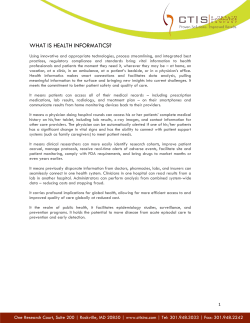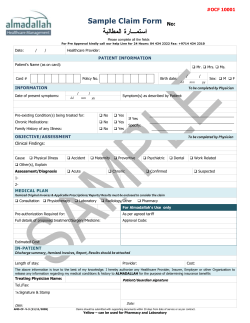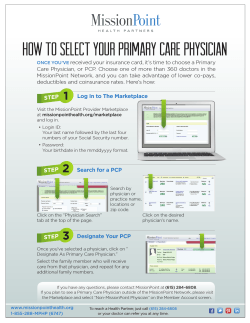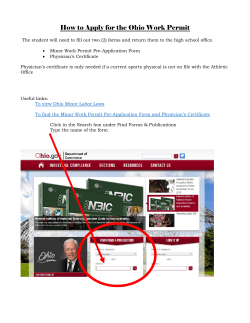
The Scope of Practice of Midlevel Providers
The Scope of Practice of Midlevel Providers James A. Robertson, Esq. jrobertson@mdmc-law.com Midlevel Providers Scribe Medical Technologist (MT) Limited Practical Nurse (LPN) – N.J.S.A. 45:11-27 Registered Nurse (RN) – N.J.S.A. 45:11-23 Advanced Practice Nurse (APN) – N.J.S.A. 45:11-49 Physician Assistant (PA)- N.J.S.A. 45:9-27.10 to -27.28 Typical Qualifications for Scribe Scribes are not licensed >However, non-physician practitioners which are licensed, such as nurses, may perform scribe services >May be a pre-medical student at an accredited University, or post baccalaureate with a premedical degree Usually used in emergency departments May not act independently Responsibilities of Scribes Document/chart at direction of physician or practitioner (i.e., APN or PA) Accompany practitioner into exam room and document patient encounter as verbalized Navigate EMR to locate information for practitioner Track lab/radiology tests ordered and charts Document consultations by physician to private doctor, specialist, hospitalist or family member Medical Technologists (MTs) Licensure not required in N.J. at this time Need Bachelor’s Degree Nationally recognized agencies that accredit Medical Technologist programs include the Commission on Accreditation of Allied Health Education Programs (CAAHEP), the Accrediting Bureau of Health Education Schools (ABHES) and The National Accrediting Agency for Clinical Laboratory Sciences (NAACLS) Typical MT Responsibilities Microscopically examine blood and other body fluids Make cultures of body fluid and tissue samples to determine the presence of bacteria, fungi, parasites, or other microorganisms Analyze samples for chemical content or a chemical reaction and determine concentrations of compounds such as blood glucose and cholesterol levels Typical MT Responsibilities (cont’d) Type and cross-match blood samples for transfusions Evaluate test results, develop and modify procedures, and establish and monitor programs to ensure the accuracy of tests Responsibilities of Licensed Practical Nurse (LPN) casefinding reinforcing the patient and family teaching program through health teaching, health counseling and provision of supportive and restorative care under the direction of a registered nurse or licensed or otherwise legally authorized physician or dentist Practice as Registered Nurse (RN) Diagnosing and treating human responses to actual or potential physical and emotional health problems casefinding, health teaching, health counseling, and provision of care supportive to or restorative of life and well-being executing medical regimens as prescribed by a licensed or otherwise legally authorized physician or dentist Practice of RN (cont’d) Diagnosing -- identification of and discrimination between physical and psychosocial signs and symptoms essential to effective execution and management of the nursing regimen (Distinct from a medical diagnosis) Treating -- therapeutic measures to manage/execute nursing regimen Human responses -- signs, symptoms and process which denote the individual's health need or reaction to an actual or potential health problem. RN May Delegate Tasks RN may delegate/supervise select nursing tasks to LPN/ancillary nursing personnel (i.e., technicians) May not delegate nursing tasks to persons who have not been adequately prepared by “verifiable training and education” Non-delegable: tasks that require skills/knowledge obtained in nursing school Procedures that APN may Perform All tasks which RN may perform Initiating lab and other diagnostic tests Prescribing/ordering treatments, including referrals Prescribing/ordering medications and devices - Inpatient Setting > Prior consultation with doctor > Standing orders/joint protocols > APN prints (and signs) own name, certification number, and physician’s name > Physician present/readily available > Physicians reviews chart Physician Assistants (PAs) Governed by Physician Assistant Licensing Act, N.J.S.A. 45:9-27.10 to -27.28 Licensed by State BME >18 y.o. >Good moral character >Complete approved program PALA Limitations on Scope of PA Practice Direct supervision by physician Limited procedures Notice of employment filed with BME Supervising physician or PA advises patient at time of service that service to be performed by PA PA “conspicuously” wears ID tag stating “physician assistant” Limitations on Scope of PA Practice (cont’d) PA entries in clinical record appropriately signed >“PA-C” Practice beyond limitations is considered professional misconduct Procedures that PA May Perform Obtaining patient history and Performing physical exam Suturing and caring for wounds Patient counseling/education Inpatient setting: rounds, patient progress notes, therapeutic plans, narrative summaries Assist in delivery of service in private home, extended care facility, other setting Procedures that PA May Perform (cont’d) Facilitate appropriate referral of patients “Such other procedures suitable for discretionary and routine performance by [Pas] as designated by the [BME] . . . .” PA procedures performed on “discretionary and routine basis” Collecting fluids Placing and utilizing access catheters and tubes Performing minor surgical procedures Applying and removing medical and surgical appliances and devices (i.e., splints, casts) Management of emergency and life threatening conditions PA procedures performed on “discretionary and routine basis” (cont’d) Low-risk obstetrical deliveries “Subject to review by the Board, such other written procedures established by the employer, provided the procedures are within the training and experience of both the supervising physician and the [PA].” Procedures for which PA Must Obtain Order Invasive Laboratory Procedures Injections, medications and requesting diagnostic studies Suturing/caring for facial wounds or traumatic wounds Writing prescriptions or ordering medications in inpatient setting Acting as first or second assistant in OR Procedures for which PA Must Obtain Order (cont’d) Other diagnostic, therapeutic or interventional procedures (i.e., radiological studies) Catchall: such other procedures as established by employer PAs cannot perform needle EMGs. Selective Ins. Co. o Am. v. Rothman, 208 N.J. 580 (2012). McElroy, Deutsch, Mulvaney & Carpenter, LLP Tel. (973) 993-8100 Dir. (973) 348-5307 James A. Robertson, Esq. jrobertson@mdmc-law.com
© Copyright 2025












